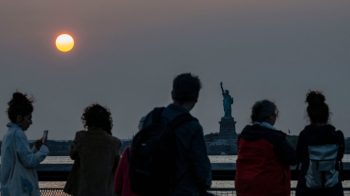Japan tourism hit by earthquake, nuclear leak
Kai Ryssdal: Most of what’s being said out there about the economic impact of the earthquake in Japan has been about the industrial effects. Factories that have been closed down and supply chains that have been interrupted.
But the service economy’s been walloped as well. Until about 10 days ago, tourism was a $300 billion a year industry there.
Marketplace’s Rob Schmitz has more of our coverage of the economic effects of the disaster from Tokyo, a city that in an average year draws millions of tourists.
Rob Schmitz: Rickshaw drivers call out to visitors of Tokyo’s Sensoji Temple. All the guidebooks say this is the place to visit if you’ve got just one day in Tokyo. But now with the threat of radiation in the air, one day in Tokyo is one day too long for most tourists, says driver Haruyuki Asaka.
Haruyuki Asaka: This is usually the time of year when business picks up, because it’s close to cherry blossom season. But our sales are about 10 percent of what we usually make.
Asaka manages a rickshaw tour company. He’s usually in the office dressed in a suit and tie. But today he’s wearing a traditional rickshaw uniform: navy blue robe, tights, and form-fitting shoes. He’s carrying the few tourists up and down the neighborhood’s alleys.
Asaka: The business is running in the red, and I’m a full-time employee. Our drivers aren’t. So if I run the rickshaw myself, it’ll help save the company money.
Last year, a record nine and a half million foreigners visited Japan. On a typical day, Sensoji Temple is teeming with them, but there isn’t one foreign face among the Japanese worshipers today. Wait — there’s a couple. I run through a courtyard to track them down. They’re Miguel Maledo and Silvia Alonso, and they’re from Spain. They’re just as surprised to see me.
Miguel Maledo: Maybe you’re the only one that we’ve seen since we’ve been here!
Schmitz: It’s just us three.
Maledo: I think so, yeah.
The two were visiting friends in Osaka, a city about 350 miles south from the Fukushima nuclear plant. They’re a little worried about sticking around, but not for reasons you’d think.
Maledo: I’ve been more worried for our families than for the actual problem. Because they’ve been trying to get into contact with us, sending e-mails asking us to leave the country and come back home, and we’ve been trying to explain for a week that nothing’s happening in Osaka, always happening in north of Japan.
Down an alleyway is a souvenir shop run by Yuhki Kinoshita. She sells kimonos, traditional sandals, and postcards. All her signs are in English. Ninety percent of her customers are foreigners. She says her business has dropped off 98 percent since the earthquake hit.
Yuhki Kinoshita: I’m a single mother, and I’m supporting my father, too, so I’m doing whatever it takes to make money. We’ve just started selling our goods on the Internet to foreigners who are too scared to come to Japan. We’re also tailoring our souvenirs to what Japanese tourists might like.
Despite radiation fears, today’s crowd at Sensoji Temple is an unusually big one. There may be no foreigners, but Kingo Izumi is one of many Japanese visitors.
Kingo Izumi: I came here expecting to have the place to myself, but there’s a lot of people here. This gives me hope.
Izumi came here to pray for his ancestors; something he does regularly. He suspects many are here to pray for those who’ve perished in last week’s disaster. If there’s a silver lining to all of this for Japan’s tourism industry, he says, maybe it’ll encourage more Japanese to start visiting — and maybe even contributing to — their local temples.
In Tokyo, I’m Rob Schmitz for Marketplace.
There’s a lot happening in the world. Through it all, Marketplace is here for you.
You rely on Marketplace to break down the world’s events and tell you how it affects you in a fact-based, approachable way. We rely on your financial support to keep making that possible.
Your donation today powers the independent journalism that you rely on. For just $5/month, you can help sustain Marketplace so we can keep reporting on the things that matter to you.


















